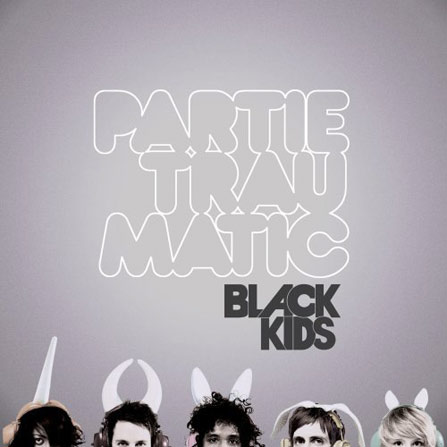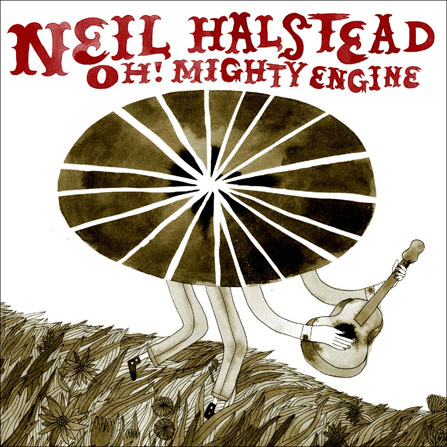
Partie Traumatic
Columbia
Partie Traumatic could very well become this year’s cautionary tale. There have been instances of the blogosphere’s direct influence on consumer tastes and upstart band trajectories before (Clap Your Hands Say Yeah, an obvious example), but nothing of this magnitude. It seems like only yesterday Jacksonville’s Black Kids leaked out a small handful of demos to an unsuspecting public (it was actually August of last year) and the praise came just as fast as the EP’s runtime. To be honest, those first four songs were perfectly infectious dalliances in lighthearted synth-funk and indie-jangle worthy of such superlatives. “Hit the Heartbrakes” and “I’m Not Gonna’ Teach Your Boyfriend How to Dance With You,” though here re-recorded with Suede’s Bernard Butler and lacking that initial charm and glossed over with studio slickness, still manage to define the group as a sort of Cure-meets-Rainbow Brite-meets-Arcade Fire communal pop exposition. If they were to try and replicate these organic moments of discovery or at least take the time needed to nurture leader Reggie Youngblood’s flawed, but flashy, songwriting, Partie Traumatic might be more than a total waste of time. Besides the previously released quartet of songs, there’s not even a piece of candy-coated ephemera here worth mentioning.
Sadly it seems Youngblood and his crew of inexperienced twee-nauts were prematurely baited into a lucrative record deal and hurried through a full-length with the aforementioned “well-known” producer. It’s apparent many of these jingles were created, en route to a summer playing festivals in Europe, in the studio, rushed and filled in with (extremely) goofy euphemisms in order to conform to contractual obligations. Youngblood isn’t exactly rough on the ears, even if his vamp on Robert Smith (right down to the doot-doots) is a bit tired; it’s his lyrical delivery that bombs in about every instance. Couple that smugness with a duo of females bopping flirty teen-isms in the background, complete with irritating keyboard squelch, and you’re bound for disastrous results. Very unfortunate considering how much promise that first glimpse allowed.
Kevin J. Elliott

Oh! Mighty Engine
Brushfire
Since his days fronting Slowdive in the early ‘90s, Neil Halstead has always shrouded his musical dalliances in a certain haze. But where with Slowdive he utilized a fuzzy shoegaze gauze, he’s used a filter less turbulent with Mojave 3, instead bathing his songs in the sun to a dizzying degree. But working on his own, he’s lifted the obfuscation, his gossamer voice the only narcotic left.
Like Halstead’s solo debut from 2002, Sleeping on Roads, Oh! Mighty Engine isn’t a complex record by any means. It’s primarily the sound of Neil and his nylon-stringed guitar deftly creating small, but poignant, observations on the people who populate his world. With an air of Nick Drake and a hint of Leonard Cohen, Halstead balances melancholy, pop melodies and folk intricacies, his wistful voice implying more than it emotes. He’s at his best on “Spinning for Spoonie” and “Witless or Wise,” the latter recalling so much of his oeuvre while still being a continuation on the sound he’s made his own. But Halstead moves in small ways out of his comfort zone too. On “Always the Good,” he puts down his guitar and replaces it with electronic tones and an unobtrusive bass line, building the song at a slow pace until it becomes a mantra of sorts. Even with his music devoid of special effects, it’s hard not to fall under Halstead’s spell.
Stephen Slaybaugh
MP3: “Paint a Face”

Falcon ep
No Office
The eponymous EP from New York City’s Falcon calls to mind indie rock’s mid-90s heyday. Heartfelt vocals over shimmering guitar, gigantic drums with oceanic cymbals, throbbing bass, loud-quiet-loud song structures—it’s all here. As it’s 2008, is there room on the shelf for another ‘90s rehash? Can you fault a kid for writing derivative pop songs years before the bands he cribbed from existed? Jared Falcon wrote and recorded 366 songs between 1987 and 1988 at the age of 14; five of them appear here. Shannon Ferguson (guitar), Neil Rosen (vocals and guitar), Jeff Wiens (keyboard) and Jason Molina (drums) worked up and rearranged Jared Falcon’s pieces into radio-ready songs with sonic reverence.
Standout “The Sandfighter” begins with a clear, ringing guitar led by Neil Rosen’s falsetto before the rhythm section crashes down and buries everything. At first Rosen’s high-pitched singing comes across slightly shaky, but as it blends with the guitar sound through the rest of the record, the nearly missed notes and voice cracks reveal an authentic vulnerability. It is refreshing to hear a singer that is not afraid to get a little sappy when the songs call for it, as opposed to a singer like Chris Martin who seems to write songs around his super-emotive vocals. Of course, Rosen isn’t to blame for the somewhat corny lyrics because Jared Falcon wrote them all. Skeptics could posit the story behind the band as half-baked and unbelievable, but the music eclipses any concerns of leg-pulling. Credit giving aside, the back-story is irrelevant. The spacey hand-claps on “Listen In” are smile inducing; the fully danceable bass line in “Q of T” will make you bob your head; and “Birds and Mice” would make a great, epic lead song on a mixtape for a high school sweetheart. The real tragedy here is that Jared Falcon did not have the chance to realize his work in the late ‘80s because he would have given Ride or Slowdive or even Radiohead competition for coveted Walkman slots worldwide.
Michael P. O’Shaughnessy

Can You Deal With It?
Bloodshot
Though he recorded several hit records in the ‘50s and ‘60s and worked with Motown, Andre Williams spent much of the ‘80s and ‘90s on the street coping with a drug addiction. Fortunately, with 1998’s Silky, Mick Collins (of the Dirtbombs) and Dan Kroha (of the Demolition Doll Rods) did for Williams what Jon Spencer did for RL Burnside, essentially resuscitating his career by turning on a new generation of garage rock fans ripe for some gritty R&B done by the real deal. (Williams would work with Spencer too, on 2000’s The Black Godfather.)
With each subsequent record, Williams has enlisted a different group of youngsters to back him. For Can You Deal With It? he’s rounded up the New Orleans Hellhounds, a relatively unknown outfit. The band does their part, backing Williams’ lewd come-ons with a suitably raunchy mix of soulful keys, fuzzy guitar screech and smashing beats. On the title track, they help prop up an otherwise impotent cut, while Williams fares better on “Never Had a Problem,” delivering some vitriolic indignation to match the stomping, horn-led gutter-funk of the Hellhounds. Similarly, “If You Leave Me” cuts a jagged groove, horns again blasting through a melee of guitar and reverberating Hammond tones while Williams describes the impending devastation and ire if he can’t any. But elsewhere the record is without potency, Williams’ lasciviousness lacking any real balls.
Stephen Slaybaugh
MP3: “Never Had a Problem”

Migration
Ernest Jennings
The promotional material that accompanies Takka Takka’s sophomore album, Migration, goes into great detail explaining how the Brooklyn-based band is part of an emerging generation of artists that appropriate world music without the moral mess of colonization, while in the same breath accusing legends like David Byrne and Joe Strummer of creative theft. It’s not that such statements are wrong, but within Migration one has to search fairly deep to find the group playing with global tropes. Compared to contemporaries like Yeasayer and Animal Collective, Takka Takka is tame and have become sneakily subversive in their inclusion of highlife guitars or gamelan drone. Focus and you’ll find it, but this subtlety belies them as novelty and eventually makes for a rewarding album.
Much of the record owes more to dreamy post-rock than South Africa or Indonesia. “Everybody Say” toys with the breezy jazz-pop crafted by the Sea and Cake; “Fall Down Where You Stand” sparkles as a less-crunchy study of Explosions in the Sky’s instrumental escapism; and “Lion in the Waves,” the odd-gem out, stalks a gentle melody with acoustic guitar and distant layers of vocal. Each song relies on the skill of a cohesive band instead of exotic accoutrements, however, when those tiny treasures are revealed—the hypnotic synth and riff syncopation of “The Takers” or the Phillip Glass inspired intro “Monkey Forest Road”—Takka Takka begins to inhabit that world music spectrum that’s certainly not world music, but a band just being inventively normal.
Kevin J. Elliott
ALBUM REVIEWS
CSS, Donkey
Bodies of Water, A Certain Feeling
Buffalo Killers, Let It Ride
Negativland, Thigmotactic
Sic Alps, U.S. Ez
Eden Express, Que Amors Que
Hit the Lights, Skip School, Start Fights
Mugison, Mugiboogie
U.S. Girls, Introducing...
Beck, Modern Guilt
Albert Hammond, Jr. ¿Como Te Llama?
The Melvins, Nude With Boots
Bad Religion, New Maps of Hell (Deluxe Edition)
Ratatat, LP3
